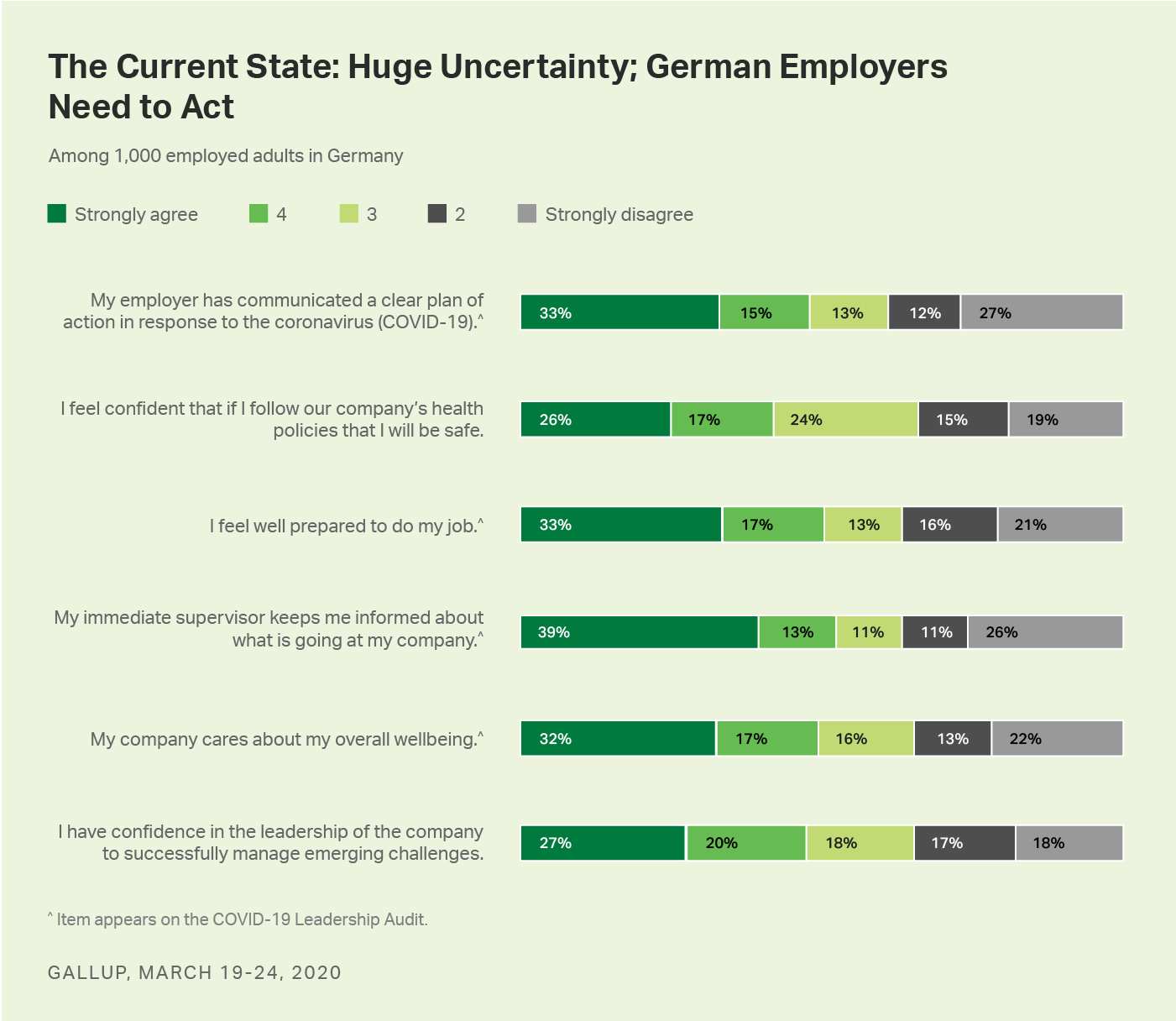Story Highlights
- Trust in business leadership has fallen from 41% in 2019 to 27% today
- Employees worried about personal safety are at risk of disengagement
- Creating and communicating a clear plan will help win back trust
A recent Gallup survey in Germany shows a disturbing discovery among German employees: a growing sense during the COVID-19 pandemic that corporate leadership can't be trusted to manage emerging challenges and that leaders don't care about employees' wellbeing.
In fact, one-third of German employees (32%) strongly agree that their organization cares about their wellbeing, and a quarter of workers (27%) strongly agree that they have confidence "in the leadership of the company to successfully manage emerging challenges." And no question elicited a majority strong-positive response -- not even close.
- 33% strongly agree that their employer has communicated a clear plan of action in response to the coronavirus
- 26% are confident that their company's health policies will keep them safe
- 33% feel well prepared to do their job
- 39% say their immediate supervisor keeps them informed about what is going on in their organization
Either leaders' COVID-19 plans are lacking or they're failing to communicate them effectively. As a result, trust in business leadership to successfully manage emerging challenges has fallen significantly, from 41% in 2019 to 27% today.

The COVID-19 situation is shaking employees' confidence in company leadership. Gallup found that just 8% of those who believe their leaders have no clear plan to deal with COVID-19 strongly agree that those leaders are prepared to manage emerging challenges -- and among those who disagree with the statement "I have confidence in the leadership of the company to successfully manage emerging challenges," zero employees are engaged.
This should be of serious concern to businesses because only 15% of adults working for an employer in Germany are engaged, and employees' beliefs affect business performance: Employees who are worried about their personal safety and job security are at risk of disengagement, and disengaged workers tend to be unfocused and unmotivated. Actively disengaged employees, who comprise 16% of the workforce in Germany, are inclined to commit deliberate or passive sabotage. That's disastrous in any organization, and a threat to those bracing for an economic downturn.
Leaders Must Act Fast to Win Back Trust
German business leaders need to turn this around quickly. Even slight doubts about leaders' ability to deal with COVID-19 reduces employees' confidence in management to master challenges ahead. For example, when asked to rate their level of agreement (on a 1-to-5 scale, where 1 means strongly disagree and 5 means strongly agree) with the statement "My employer has communicated a clear plan of action in response to the coronavirus or COVID-19," 60% of those who rate it a 5 also strongly agree that they "have confidence in the leadership of the company to successfully manage emerging challenges." Among those who rate the "clear plan of action" item as a 4 instead of a 5, only 24% strongly agree that they have confidence in leadership to manage emerging challenges.
The data suggest that workers see having a clear COVID-19 plan as synonymous with having the ability to handle problems. So obviously, a clear, data-based crisis management response is necessary. Gallup recommends including an audit of employee opinions in that plan. That audit will show leaders where employees most need their support. Then, leaders must communicate that plan frequently, honestly and companywide.
The data suggest that workers see having a clear COVID-19 plan as synonymous with having the ability to handle problems. So obviously, a clear, data-based crisis management response is necessary.
Employee wellbeing is fundamental to that plan, so leaders should clarify how their decisions can help keep people safe from the novel coronavirus contagion. However, physical health is not the only criterion of wellbeing -- Gallup research finds five discrete elements. Employers must show a compassionate, personal interest in employees' concerns about emotional isolation, job insecurity and health to sustain their wellbeing.
Long-term research in Germany shows that this is an atypical management approach for most leaders -- who tend to value professional and technical expertise with a focus on efficient processes more than the management of human emotions -- but a necessary change.
Companies that appear to dismiss employee wellbeing will not be trusted by their employees or their customers, not now and not when the pandemic has ended.
That ending may arrive in Germany sooner than elsewhere. Health experts say the COVID-19 curve is already flattening, largely because of Germans' disciplined approach to social distancing. Gallup finds steady increases in the practice, which implies that German businesses may be among the first to return to normal operations.
Will they return with the trust of their employees? No, not if current trends continue. But it's not too late to win back their employees' trust and engagement -- and along with those, their business' ability to produce and compete at peak performance when the pandemic ends.
Learn more about leading through disruption and stay up to date on Gallup's COVID-19 research:
- Register for this weekly webcast for Gallup's latest COVID-19 data and insights.
- Read more articles like this one.
- Check out our resource page, COVID-19: Leading Through Disruption.



